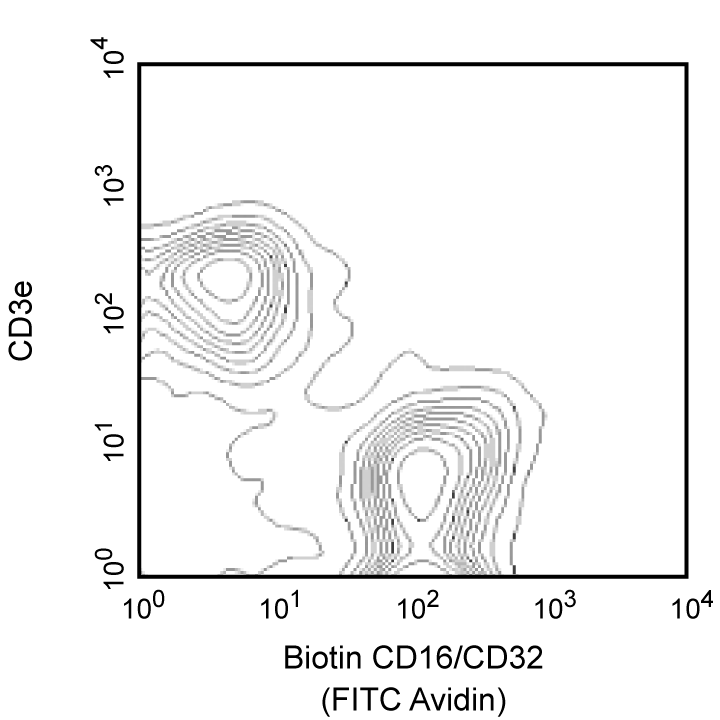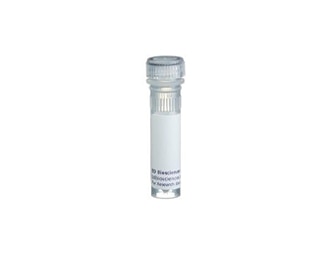Old Browser
Looks like you're visiting us from {countryName}.
Would you like to stay on the current country site or be switched to your country?




Two color analysis of the expression of CD16/CD32 on mouse spleen cells. C57BL/6 splenocytes were simultaneously stained with PE-conjugated anti-mouse CD3e mAb 145-2C11 (Cat. No. 553063/553064) and biotinylated 2.4G2 mAb, followed by Avidin-FITC (Cat. No. 554057). Flow cytometry was performed on a BD FACScan™ flow cytometry system.


BD Pharmingen™ Biotin Rat Anti-Mouse CD16/CD32

Regulatory Status Legend
Any use of products other than the permitted use without the express written authorization of Becton, Dickinson and Company is strictly prohibited.
Preparation And Storage
Product Notices
- Since applications vary, each investigator should titrate the reagent to obtain optimal results.
- Please refer to www.bdbiosciences.com/us/s/resources for technical protocols.
- Caution: Sodium azide yields highly toxic hydrazoic acid under acidic conditions. Dilute azide compounds in running water before discarding to avoid accumulation of potentially explosive deposits in plumbing.
Companion Products

.png?imwidth=320)
The 2.4G2 antibody specifically recognizes a common nonpolymorphic epitope on the extracellular domains of the mouse FcγIII (CD16) and FcγII (CD32) Receptors. It has also been reported to bind the FcγI receptor (CD64) via its Fc domain. 2.4G2 mAb blocks non-antigen-specific binding of immunoglobulins to the FcγIII and FcγII, and possibly FcγI, Receptors in vitro and in vivo. CD16 and/or CD32 are expressed on natural killer cells, monocytes, macrophages, dendritic cells (at low levels), Kupffer cells, granulocytes, mast cells, B lymphocytes, immature thymocytes, and some activated mature T lymphocytes.
This antibody is routinely tested by flow cytometric analysis. Other applications were tested at BD Biosciences Pharmingen during antibody development only or reported in the literature.
Development References (15)
-
Araujo-Jorge T, Rivera MT, el Bouhdidi A, Daeron M, Carlier Y. An Fc gamma RII-, Fc gamma RIII-specific monoclonal antibody (2.4G2) decreases acute Trypanosoma cruzi infection in mice. Infect Immun. 1993; 61(11):4925-4928. (Clone-specific). View Reference
-
Benhamou M, Bonnerot C, Fridman WH, Daeron M. Molecular heterogeneity of murine mast cell Fc gamma receptors. J Immunol. 1990; 144(8):3071-3077. (Clone-specific: Immunoprecipitation). View Reference
-
Jensen WA, Marschner S, Ott VL, Cambier JC. FcgammaRIIB-mediated inhibition of T-cell receptor signal transduction involves the phosphorylation of SH2-containing inositol 5-phosphatase (SHIP), dephosphorylation of the linker of activated T-cells (LAT) and inhibition of calcium mobilization. Biochem Soc Trans. 2001; 29(6):840-846. (Clone-specific). View Reference
-
Katz HR, Arm JP, Benson AC, Austen KF. Maturation-related changes in the expression of Fc gamma RII and Fc gamma RIII on mouse mast cells derived in vitro and in vivo. J Immunol. 1990; 145(10):3412-3417. (Clone-specific: Immunoprecipitation). View Reference
-
Kurlander RJ, Ellison DM, Hall J. The blockade of Fc receptor-mediated clearance of immune complexes in vivo by a monoclonal antibody (2.4G2) directed against Fc receptors on murine leukocytes. J Immunol. 1984; 133(2):855-862. (Clone-specific: Blocking). View Reference
-
Lewis VA, Koch T, Plutner H, Mellman I. A complementary DNA clone for a macrophage-lymphocyte Fc receptor. Nature. 1986; 324(6095):372-375. (Clone-specific). View Reference
-
Mellman IS, Unkeless JC. Purificaton of a functional mouse Fc receptor through the use of a monoclonal antibody. J Exp Med. 1980; 152(4):1048-1069. (Clone-specific: Immunoprecipitation). View Reference
-
Perussia B, Tutt MM, Qiu WQ, et al. Murine natural killer cells express functional Fc gamma receptor II encoded by the Fc gamma R alpha gene. J Exp Med. 1989; 170(1):73-86. (Clone-specific). View Reference
-
Ravetch JV, Luster AD, Weinshank R, et al. Structural heterogeneity and functional domains of murine immunoglobulin G Fc receptors. Science. 1986; 234(4777):718-725. (Clone-specific). View Reference
-
Rodewald HR, Awad K, Moingeon P, et al. Fc gamma RII/III and CD2 expression mark distinct subpopulations of immature CD4-CD8- murine thymocytes: in vivo developmental kinetics and T cell receptor beta chain rearrangement status. J Exp Med. 1993; 177(4):1079-1092. (Clone-specific: Immunoprecipitation). View Reference
-
Rodewald HR, Moingeon P, Lucich JL, Dosiou C, Lopez P, Reinherz EL. A population of early fetal thymocytes expressing Fc gamma RII/III contains precursors of T lymphocytes and natural killer cells. Cell. 1992; 69(1):139-150. (Clone-specific: Immunoprecipitation). View Reference
-
Takezawa R, Watanabe Y, Akaike T. Direct evidence of macrophage differentiation from bone marrow cells in the liver: a possible origin of Kupffer cells. J Biochem (Tokyo). 1995; 118(6):1175-1183. (Clone-specific). View Reference
-
Titus JA, Finkelman FD, Stephany DA, Jones JF, Segal DM. Quantitative analysis of Fc gamma receptors on murine spleen cell populations by using dual parameter flow cytometry. J Immunol. 1984; 133(2):556-561. (Clone-specific). View Reference
-
Unkeless JC. Characterization of a monoclonal antibody directed against mouse macrophage and lymphocyte Fc receptors. J Exp Med. 1979; 150(3):580-596. (Immunogen). View Reference
-
Vremec D, Zorbas M, Scollay R, et al. The surface phenotype of dendritic cells purified from mouse thymus and spleen: investigation of the CD8 expression by a subpopulation of dendritic cells. J Exp Med. 1992; 176(1):47-58. (Clone-specific). View Reference
Please refer to Support Documents for Quality Certificates
Global - Refer to manufacturer's instructions for use and related User Manuals and Technical data sheets before using this products as described
Comparisons, where applicable, are made against older BD Technology, manual methods or are general performance claims. Comparisons are not made against non-BD technologies, unless otherwise noted.
For Research Use Only. Not for use in diagnostic or therapeutic procedures.
Report a Site Issue
This form is intended to help us improve our website experience. For other support, please visit our Contact Us page.